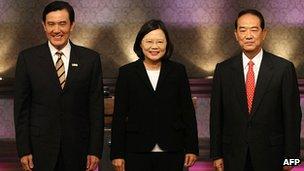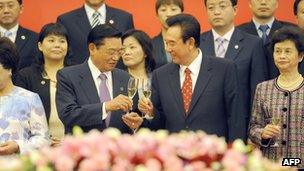Viewpoint: Taiwan needs closer economic ties with China
- Published

Relations with China have been a key topic of debate in the run-up to Taiwan's elections
Taiwan's economy has become increasingly dependent on China. This is an inevitable trend and a change of government in Taipei will not have much impact.
To be more accurate, the two economies are closely linked as parts of the international production chain serving the markets of developed countries.
The Ma Ying-jeou administration in its first term adopted a pragmatic and friendly policy towards the Mainland, and it had been rewarded by the establishment of the three direct links (trade, transport and postal) as well as an Economic Co-operation Framework Agreement (ECFA).
The former have facilitated more trade and investment flows; the latter has similar effects, and it has potentially allowed Taiwan to benefit from various free trade agreements concluded or to be negotiated between China and other countries.
Despite the fact that it is diplomatically recognized by about two dozen small states, Taiwan hopes to avoid economic isolation through the ECFA.
Chinese concessions
To consolidate relations with the Ma Ying-jeou administration, and to win the hearts of Taiwan people, the Chinese authorities have been making economic concessions.
In recent years, they have been targeting the farmers in central and southern Taiwan, the key bases of electoral support for the Democratic Progressive Party (DPP).
DPP heads of local governments have warmly responded too. Their slogan, not too loudly articulated, is "take the benefits and continue to vote for the DPP".
If Ma Ying-jeou wins a second term, cross-straits economic ties are expected to continue to strengthen.
However, the Chinese authorities will expect something in return, ie, the start of political negotiations. Resistance to the talks may lead to some pressure from Beijing.
The Taiwanese business community in mainland China will likely be mobilised to support the initiative. Most top business leaders in Taiwan have indicated their preference for Mr Ma in the present election campaign.
Continuation
People in Taiwan understand their economic dependence on the mainland and they have no intention to provoke the Chinese leadership. Even President Chen Shui-bian in his inauguration in 2000 had to pledge not to violate Beijing's baseline.
Tsai Ing-wen would likely follow Chen's example if she wins the presidential election.
She is not expected to allow the economic ties to deteriorate sharply, as this will hurt the economy and the government's popularity.
Chinese leaders abandoned setting a timetable for reunification a decade ago, as they know that they have to learn to deal with a DPP administration, if not in 2012, then in the future years.
Breakthroughs in cross-straits political ties require a broad consensus in Taiwan, and a certain level of DPP endorsement is essential.
Right balance
Closer economic ties with the mainland is part of the globalisation process for Taiwan.
They bring economic growth, but also a widening gap between the rich and poor. The benefits of economic development are perceived to be increasingly unfairly distributed.
This has been a severe challenge to the Ma Ying-jeou administration, and will be challenge for future governments as well. To some extent, Beijing realizes the problem and has been trying to respond, but its measures can only have a limited impact.

Taiwan and China have taken steps to foster closer economic ties in recent times
Taiwan's challenge has been the upgrading of industries in China. As the latter develops its hi-tech industries, Taiwanese manufacturers will encounter increasing competition.
Besides the problems associated with the widening gap between the rich and poor, Taiwan has to spend considerably more on research and development, as well as to improve its education system, especially the tertiary sector.
Furthermore, the existing international production chain continues to evolve as well.
The growth rate of Chinese exports to the United States and the European Union has been in decline since the global financial crisis started in 2008.
At the same time, its trade with emerging economies such as India, Russia and Brazil, members of the BRICs group (Brazil, Russia, India And China) has been on the rise.
This essentially means that China is reducing its trade dependence on the US and EU, and as part of the same international production chain, the Taiwanese business community has to overcome these challenges too.
To make it easier to achieve that, closer co-ordination between Taipei and Beijing is called for, and this demands better political ties.
- Published14 December 2011
- Published30 November 2011
- Published3 January 2012